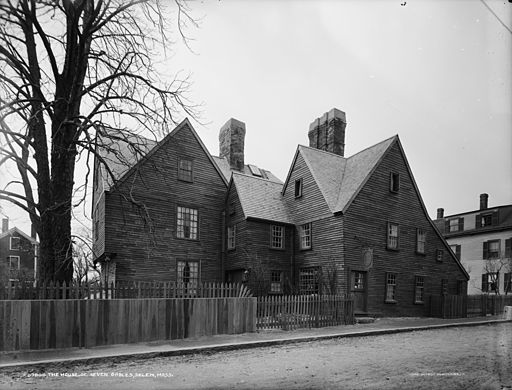The House of the Seven Gables
New England, early 1800s. Hepzibah Pyncheon, a hermit-like woman with a severe face and a soft heart, lives quietly in the seven-gabled Pyncheon House. She is rescued from poverty only when her young relative, Phoebe, comes to live with her and help her run a small shop. Phoebe is interested to meet the other lodger at Pyncheon House, a daguerreotypist by the name of Holgrave, but more mysterious is Hepzibah's desperation to protect her brother Clifford from the influence of Judge Jaffrey, a cousin and seemingly benevolent man. As Phoebe and Holgrave discover, the key to the Pyncheon siblings' troubles is deeply connected to the house's history, and that of its sinisterly respectable founder, Colonel Pyncheon.
I must say I found Nathaniel Hawthorne's The House of the Seven Gables to be overall disappointing, in comparison with The Blithedale Romance or The Marble Faun. If this were a movie, I'd sum it up by saying that the concept was great and the execution was poor. There is enough action to make it a page-turner - the problem is, the action comes at the very end of the book, and everything before it is mostly descriptions, atmosphere, and setting, with relatively little dialogue. Knowing none of Clifford's backstory for most of the book, I failed to connect with the conflict early enough. Character-wise, Phoebe turned out to be exceedingly bland, and Hepzibah was actually most interesting, which didn't do much for the plot.
That said, the themes really are great, and the house is a bit of a character in itself. Initially, Phoebe is quite a modern character, leaving her unhappy home life (due to her mother's second marriage) and seeking to live independently, much like Hilda from Marble Faun. Ironically, this leads her to Hepzibah's ancient house, just as Hilda goes to Rome. This sort of old vs. new contrast is one of the highlights of the book and shows up in a number of elements. Another effective part is the Pyncheon death/"curse" - pretty grisly and borderline Edgar Allan Poe. Some of the scenes with Clifford were also interesting, since he is rather eccentric. Historical references include the Salem witch trials, greed related to territorial expansion, and certain modern strengths/weaknesses (e.g. the railway vs. mental institutions).
I give this 4 out of 5 stars, because I'm glad I read it, even if it wasn't my favorite Hawthorne.




Comments